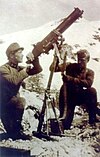Kropatschek rifle
Appearance
This article needs additional citations for verification. (October 2017) |
A Kropatschek is any variant of a rifle designed by Alfred von Kropatschek. Kropatschek's rifles used a tubular magazine (constructed of nickel-plated steel) of his design, of the same type used in the Japanese Murata Type 22 and the German Mauser Gewehr 1871/84. While designed for black powder, the Kropatschek action proved to be strong enough to handle smokeless powder.
The Kropatschek was the basis for the French Lebel M1886.[11]
Variants
[edit]- Gendarmerie Repetier-Karabiner M1881: 11 mm Gendarmerie Carbine (also known as M1874/81);
- Kropatschek Torpedo Boats Gewehr M1893: 8 mm Navy Rifle for Torpedo boat crews.
France:
- Fusil de Marine Mle 1878: 11 mm Navy Rifle;
- Fusil d'Infanterie Mle 1884: 11 mm Infantry Rifle;
- Fusil d'Infanterie Mle 1885: 11 mm Infantry Rifle.
Portugal:
- Espingarda de Infantaria 8 mm m/1886: 8 mm Infantry Rifle;
- Carabina de Caçadores 8 mm m/1886: 8 mm Light Infantry Carbine;
- Carabina de Cavalaria 8 mm m/1886: 8 mm Cavalry Carbine;
- Carabina da Guarda Fiscal 8 mm m/1886/88: 8 mm Treasury Guard Carbine;
- Espingarda de Infantaria 8 mm m/1886/89: 8 mm Colonial Infantry Rifle;
- Carabina de Artilharia 8 mm m/1886/91: 8 mm Artillery Carbine.
The Wassoulou Empire arms industry created functional copies of the Krophatschek rifle in the 1880s and 90s to use in their struggle against French colonial forces.[12]
See also
[edit]References
[edit]- ^ "ArmasBrasil - Carabina Kropatschek".
- ^ "Scraping the bottom of the barrel blackpowder rifles of the great war part 1".
- ^ "Foreign Rifles of the Spanish Republic, 1936-1939".
- ^ Esposito, Gabriele, Armies of the War of the Pacific 1879-83: Osprey Publishing (2016)
- ^ a b c d McCollum, Ian (2019). Chassepot to Famas: French Military Rifles 1866-2016. Headstamp Publishing. ISBN 978-1733424608.
- ^ "O EXÉRCITO REPUBLICANO" (PDF).
- ^ McLachlan, Sean (20 Sep 2011). Armies of the Adowa Campaign 1896: The Italian Disaster in Ethiopia. Men-at-Arms 471. Osprey Publishing. pp. 35–36. ISBN 9781849084574.
- ^ VILLELA Jr, M E C. CANUDOS: memórias de um combatente. 2 ed. Rio de Janeiro: EdUERJ, 1997. p. 107.
- ^ 8x56 R Kropatschek Short - MUNICION.org (spanish)
- ^ 8x60 R Guedes - Kropatschek - MUNICION.org (spanish)
- ^ "French Rifle Ammunition: 8mm Lebel and 7.5mm French". 7 August 2017.
- ^ Bocoum, Hamady (2001). "SAMORI' S SMITHIES: FROM CRAFT PRODUCTION TO ATTEMPTED MANUFACTURING, OR A DRAFT PLAN FOR TECHNOLOGICAL INDEPENDENCE". Mande Studies. 3: 55–63.
External links
[edit]- French 1878 Marine Kropatschek Forgotten Weapons


